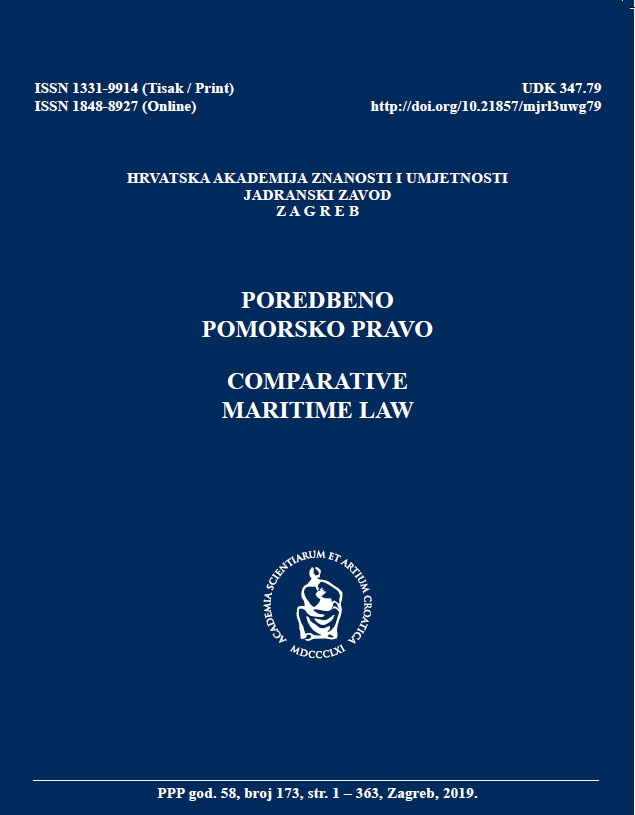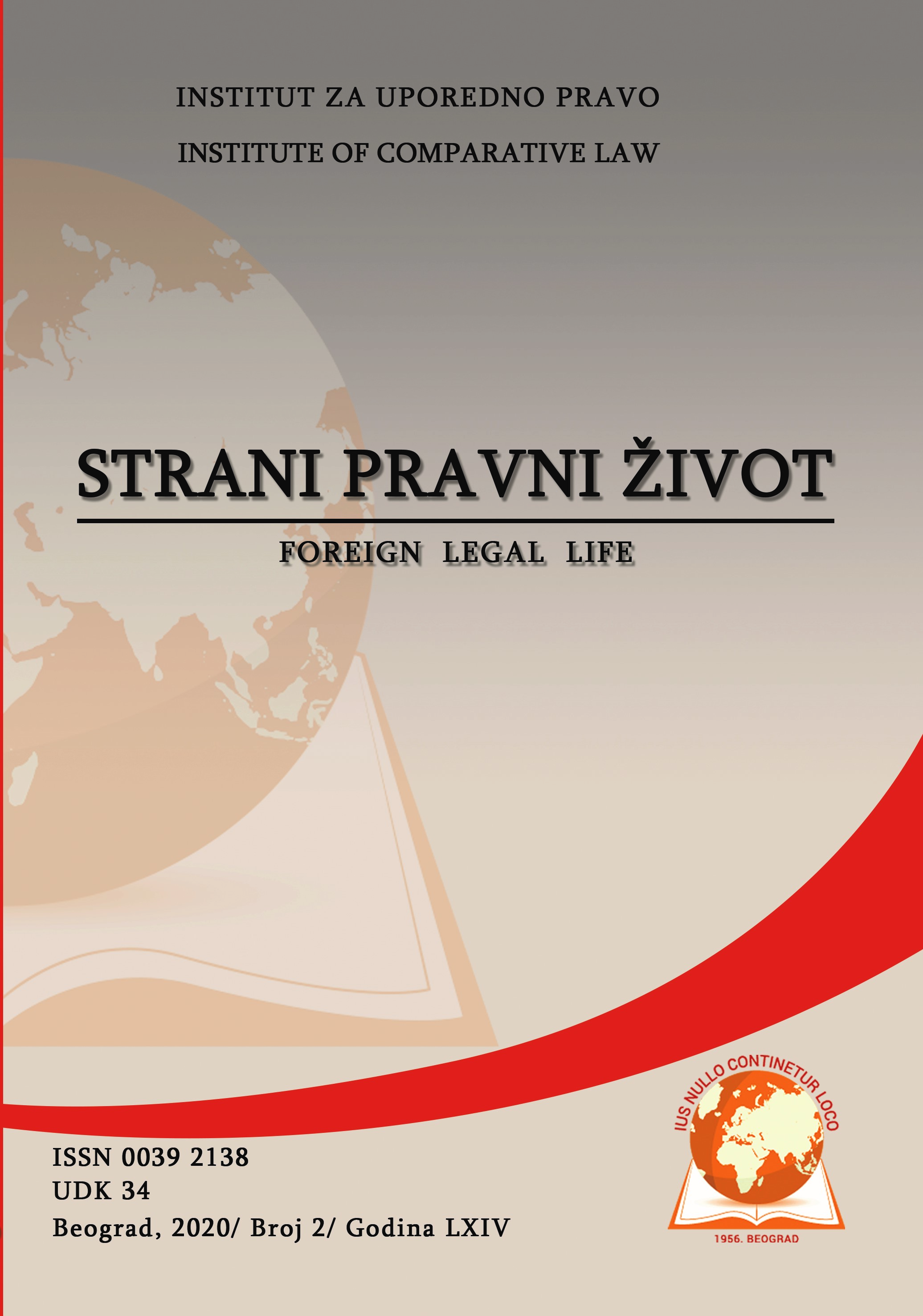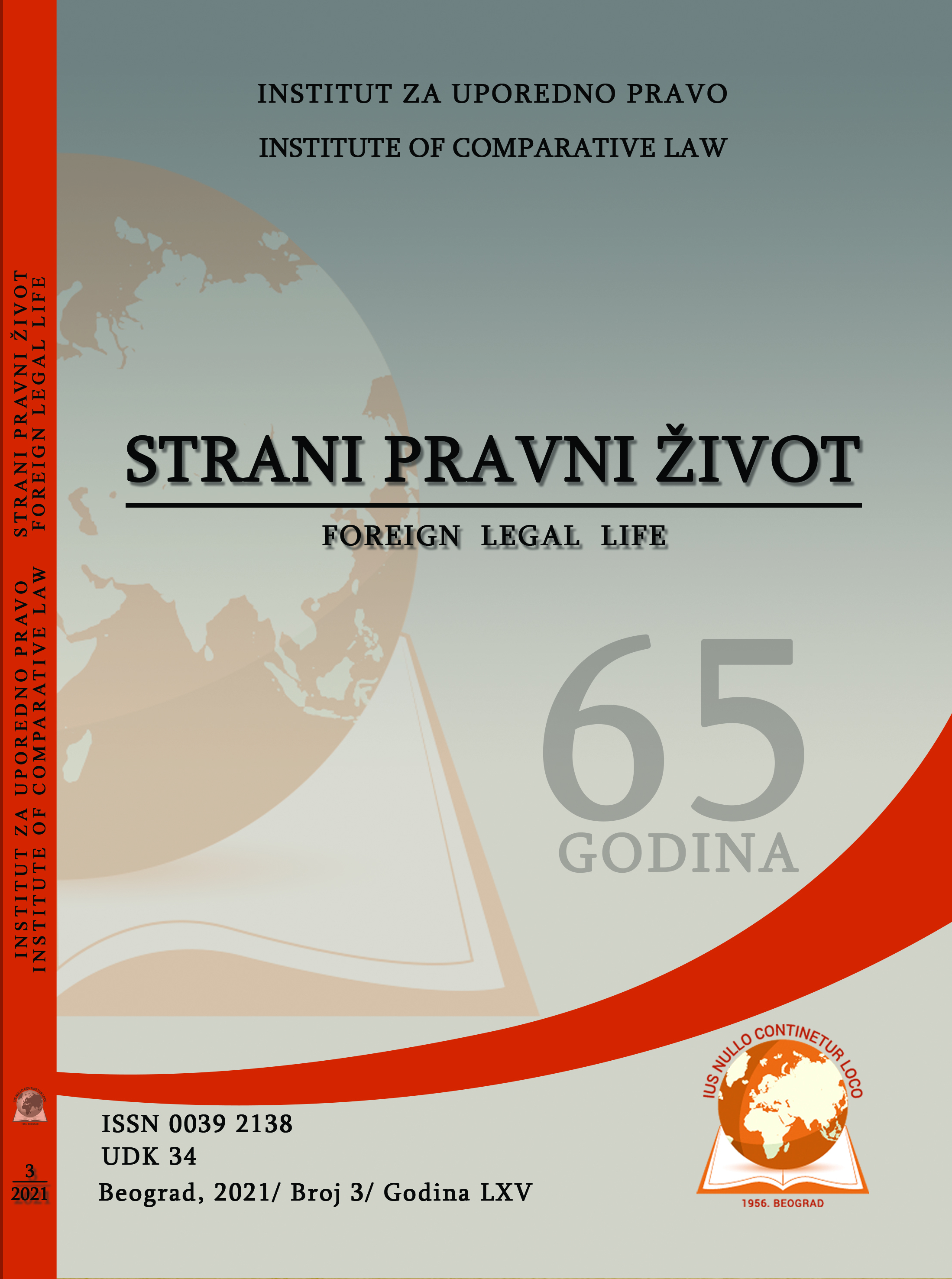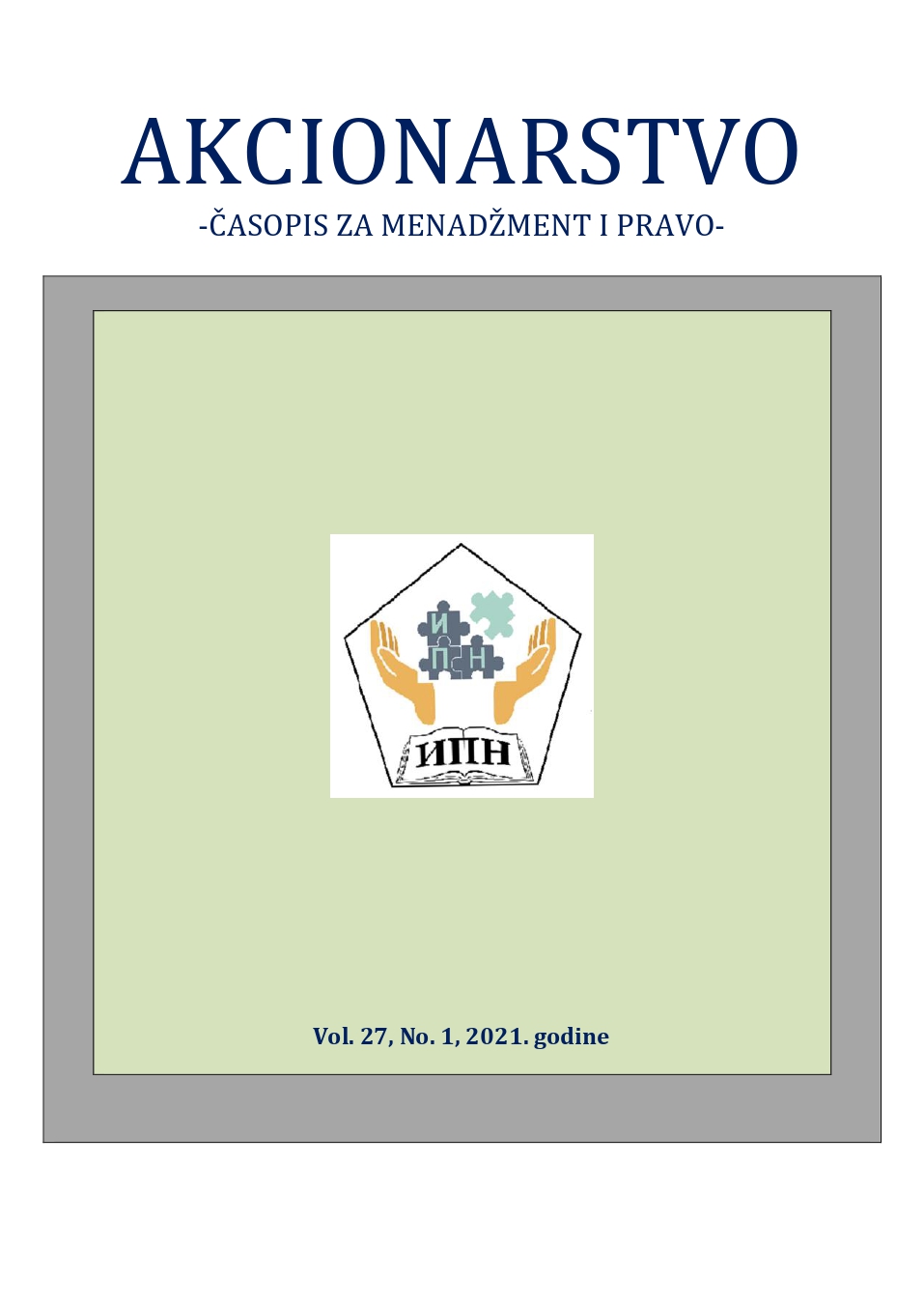
Disputed Understanding of Public and Private Interests
Sporna shvatanja javnog i privatnog interesa
Keywords: privatization; cirisis;
More...
Keywords: privatization; cirisis;
More...
Keywords: Privatization; Zastava
More...
Keywords: franchise; Bosnia and Herzegovina; business climate
The subject of the research is to analyze the advantages and disadvantages of a franchise business with a particular emphasis on the development of the franchise in Bosnia and Herzegovina. The main goals of this paper are to identify the main obstacles in the development of the franchise in Bosnia and Herzegovina and recommendation of measures to improve this business model to take advantage of its great features. Franchising is a business model that is in most cases based on a win-win relationship between the franchisor and the franchisee. Because of this, franchise is a chance for permanent development of participants in franchising. The paper shows that the franchise is extremely popular and developed way of doing business in developing countries. This is reflected in the growing path of revenues, number of employees, number of franchise locations and participation in the GDP of business entities that apply the franchise mode of operation. Applying scientific methods of synthesis, induction and deduction, determined by numerous causes slow down the development of the franchise concept in Bosnia and Herzegovina. Taking into account the above, we can formulate a hypothesis in the following way: Non-stimulating business environment and inadequate knowledge of the franchise are key reasons for the inadequate development of the franchise business in Bosnia and Herzegovina.
More...
Keywords: Zastava elektro; Serbia; Privatisation
More...
Keywords: Serbia; privatization;
Article about privatization in Serbia.
More...
Keywords: Tranzition; Serbia
More...

Kako svaka propisana terapija može postati predmet preispitivanja na sudu, tako je potrebno sa velikom pažnjom ordinirati terapiju kako ne bi došlo do grešaka koje bi mogle imati svoje reperkusije na sudu.
More...Keywords: CERSPA template agreement; »Certified Emission Reduction« (CERS); Clean Development Mechanism (CDM); Kyoto Protocol;
»Certified emission reduction« sale and purchase (model) agreement (CERSPA Template) is structured to benefit more profoundly the possibilities introduced by the »Clear Development Mechanism« (CDM) established by Kyoto Protocol. The development of industry and technology produced air pollution and global heating; the result of technical progress is constantly increasing »greenhouse effect« which threaten very seriously to destroy Earth Atmosphere. To resolve this problem International Association made some rules to reduce emission of dangerous »greenhouse gases«. One of the most important international rule is The Kyoto Protocol. The Protocol introduced three mechanisms of implementation: International Emission Trading (IET), Joint Implementation (JI) and Clean Development Mechanism (CDM). For the countries in transition, the CDM mechanisms are the most important because these mechanisms permit these countries to participate in the »emission reduction process« and to be the »playground« where these projects take place. These countries have the benefit of »green« technology projects built on their territory and the project investors have the benefit of saving »emission reduction units« (CER-s). These «emission reduction« units (CER-s) can be purchased and sold on the »carbon market«. Because the CER-s are special merchandise same special rules must be applied. Besides the Document- Instruction made by Kyoto Protocol the CERSPA template agreement is also made to facilitate the »emission unit« trade. The article is analyzing the specificities of the CERSPA template, the model agreement which is used, by the parties, as a contractual pattern which can help them to regulate their contract.
More...Keywords: continuing obligation relationship; continuing act of performance; continuing obligation; consecutive obligations;
The paper deals with the definition of the concept of a continuing obligation relationship (continuing contract). Crucial for this definition is the notion of a continuing obligation, as well as notions of a continuing act of performance and of consecutive acts of performance. Both the notion of a continuing obligation and the distinction between the consecutive obligations and the performance of an obligation in parts or instalments have been discussed in the paper. Moreover, it differentiates between the contracts for successive delivery, where the repeating of single acts of performance and counter performance at certain time intervals represent partial fulfilment of the contractual obligations, and the contracts for continuous delivery, where the obligation of successive deliveries is a continuing obligation, the scope of which depends on the duration of the contractual relationship. Based on the views developed in German, Austrian and Swiss laws, the conclusion has been drawn that it is adequate for the Croatian law to define continuing obligation relationships as obligation relationships, where the typical main obligation is a continuing obligation, that is, an obligation the subject of which is a continuing act of performance or continuous repeating of single acts of performance. The paper points out the typical continuing obligation relationships and their key distinctive features from obligation relationships that are not continuing obligation relationships, which are referred to as simple obligation relationships.
More...Keywords: employer; personally caused notice; termination of employment; employment contract; worker
Relting on the legislation and jurisprudence of the Republic of Croatia, the paper provides a review and analysis of legal rules regulating the terms and procedure of the employment contract’s ordinary notice caused by permanent characteristics or abilities of workers. Special attention is given to judicial practice which gives answers to numerous questions that arise in practice, particularly those related to the existence of reason for such a type of employment notice. In the author’s view, the legislator has justifiably allowed employers to give notice to workers who cannot perform the basic obligation of carrying out the assumed tasks; for workers’ protection, the legislator has prescribed explicit rules for notice procedure and judicial protection; then, the legislator has stipulated unfeasibility of employment on other tasks when giving notice to workers which are endangered by decrease of work ability or they already have reduced work ability.
More...Keywords: Bank; interest; law; the borrower; the notification;
Elementary business culture and business practices dictate gender parties. Unfortunately, in the domestic banking system relates Bank-borrower is not in any way reflect the contractual equality, but the discrimination was strongest borrowers. In order to create a contract of equality, the state passed a law on the protection of users of financial services. With the entry into force of the Law on the protection of users of financial services, clients have started with National Bank of Serbia intensively objections to the operation of commercial banks where there is a large number of unfounded complaints relating to personal inability reconciling credit obligations. The Act is somewhat arbitrary restrain banks but failed to completely eliminate the existence of internal bank documents as the basis for the change of conditions. The above law also does not include entrepreneurs and companies, which puts them at a disadvantage in relation to citizens as beneficiaries of the loan. The Law on the Protection of users of financial services is redundant because the issue of contractual relationships well resolved in the Law of Obligations that are clearly not consistent practices. Sam attempts to state administrative puem channeling business morale banks, there are also economic mechanisms that can’t yet use a certainty that would be more effective because it directly affected the profitability of banks.
More...Keywords: German Civil Code Reform; Limitation; Consumer purchase; Law on Obligations;
The Yugoslav law tradition is closely combined with the German one. Of from that it is also for Yugoslav lawyers interesting to attain information about changes in the right of the European neighbours and partners. With the 1.1.2002 enacted Law on the modernization of the Obligation law the German Civil code was modified comprehensively in key areas. Reason for the changes were a line of European guidelines that regulates the consumer purchase, the acceleration of the money transfers and the electronic market. The German legislator did not limit in this case to the pure conversion of these guidelines, but it resumed reform attempts, which already come from the early eighties. The changes concern basically the limitation regulations, the General part of the obligation law and the purchase and working (not labour) contract. The limitation law and the regulations on the results of erroneous services at purchase contracts were reformed comprehensively. In the limitation law a short general limitation period (three years) was introduced, that begins to run at the end of the year, in that the creditor receives knowledge of its claim and the claim opponent. Next to that long periods of time, which run independently from the knowledge, are valid. In the regulations for the course of the limitation period the interruption of the period was pushed back. In the new regulations mostly the expiry of the period is only temporary influenced by some facts. The General part of the Obligation Law was restructured completely. The changes are less contents-related. Rather demands from the science and the development of the jurisdiction were included and some special laws were integrated into the Civil Code. The results of mistakes of the purchased thing were fitted now into the general system of the bad performance. The reduction of the purchase price remains as an only purchase-particular regulation. Unfortunately the German Civil Code reform is not based on the developing European contract law consistently. The future will show whether the changes, which were enacted very rapidly, will prove themselves in the practice.
More...Keywords: Civil Rights; Politics; Judgment; Law;
Пресудом Општинског суда у Новом Саду П. бр. 2031/95 од 24. априла 1996. годиие у ставу првом изреке, тужени Павлов Петар је обавезан да се исели из собе, купатила, предсобља, терасе, шупе за огрев и оставе које се налазе у стамбеној згради у ул. Раде Смиљанова број 4 у Новом Саду, саграђене на парцели број 194 од 4 ара и 21 т2, уписане у зк. ул. бр. 6485, а која се налази у десној половини дела поменуте стамбене зграде гледано са улице са десне стране са посебним улазом и да те просторије слободне од лица и ствари преда тужиљи у посед.
More...
Keywords: package travel; linked travel arrangement; Directive (EU) 2015/2302; Directive 90/314/EEC; Act on the Provision of Tourism Services;
Directive (EU) 2015/2302 on package travel and linked travel arrangements (2015 Directive), repealing the former Directive 90/314/EC, has been transposed to Croatian legislation by the 2017 Act on the Provision of Tourism Services (APTS). In accordance with the rules of the 2015 Directive, provisions of the APTS dealing with above-mentioned tourism services are applicable from 1 July 2018. By implementing the 2015 Directive, the APTS has introduced significant changes to Croatian legislation by adding a new service – linked travel arrangement. Furthermore, the APTS has regulated the package travel contract in a new and more detailed manner compared to the formerly applicable legislation (Obligations Act, Art. 881 – 903). This paper is an in-depth scientific analysis of all the important topics related to package travel and linked travel arrangements, including the explanation (with practical examples) of the new and comprehensive definitions thereof. Special attention has been devoted to the package travel contract. Hence, the paper contains elaboration on the rightsand obligations of the contracting parties, essential elements of the contract, rights of the parties to amend the contract, rights of the traveller to terminate the contract, liability of the package organiser, etc. The relationship between relevant sources of transportation law and the stipulations of the APTS regarding travellers’ rights is also examined. The subject matter of this paper is of major importance for transportation undertakings too, since it has already been established by the practice of the European Court of Justice (in relation to the former 1990 Directive), and now expressly confirmed in the 2015 Directive, that passenger cruising represents a type of package travel service. Furthermore, depending on the characteristics of their business activities, individual professional passenger carriers may also be regarded as package organisers or providers of linked travel arrangement in the light of the APTS. In such cases, provisions of the APTS may be applicable to their rights and obligations as well. A separate chapter of the paper deals with the role of various types of compulsory and voluntary insurance (regulated by the APTS). While covering the professional risks faced by the package organisers, these types of insurance also strengthen the rights of travellers.
More...
Keywords: Principi evropskog ugovornog prava osiguranja; opcioni instrument; slabija ugovorna strana; obaveza informisanjaobaveza prijava okolnosti; povećanje rizika
Analiza domaćeg i uporednog zakonodavstva ukazuje da je i dalje prisutan nekadašnji trend regulisanja ugovornog prava osiguranja, koji se ogleda u nastojanju zakonodavaca da obezbede osiguravača od prevarnog postupanja ugovarača osiguranja. Ipak, koristeći uporednopravni i istorijski metod, ustanovili smo da nacionalni zakonodavci sve više pristupaju izmeni pravnih propisa u cilju održavanja koraka sa savremenim tendencijama, koje se ogledaju u pružanju neophodne zaštite slabijoj ugovornoj strani, tj. uslovno govoreći, potrošaču. Iz tog razloga, predmet istraživanja su određeni mehanizmi zaštite prava slabije ugovorne strane u Principima evropskog ugovornog prava osiguranja, budući da je reč o izvoru mekog prava, čiji autori su nastojali da sublimiraju što je moguće veći broj pozitivnih rešenja i uzora za postizanje većeg nivoa zaštite slabije ugovorne strane.U radu su predstavljena neka od rešenja iz Principa koja, po mišljenju autora, obezbeđuju povećanje prava slabije ugovorne strane prema osiguravaču, uz smanjenje njihovih obaveza i isključivanje isuviše strogih sankcija u slučaju pogrešnog ponašanja. Iako verovatno Principi neće ući u proces ozakonjenja na nivou Evropske unije, makar u skorijoj budućnosti, i dalje ostaje mogućnost za njihov uticaj na nacionalnom zakonodavnom i naučnom nivou. O tome svedoči i ovaj rad, čiji rezultati mogu doprineti preispitivanju aktuelnih domaćih zakonskih rešenja, i to tako što se mogu iskoristiti kao model za izmenu i unapređenje nacionalnog zakonodavstva.
More...
Keywords: liability; subject of liability; duties; problem loans; control
The paper is motivated by the author’s research into the issue of problem loans which present a serious obstacle to economic development. Taking into consideration the fact that a large amount research has been done with a goal of mitigating the effects of problem loans, the author attempts to investigate the causes of their and discusses the issue of the relationship between legal and social liability. The paper presents an analysis of the liability provisions of participants in the context of problem loans. Problem loans, in a broader sense, refer to any loans where there are problems in repayment, i.e. there is a risk in terms of an inability of a debtor to repay their debt. The main hypothesis is that each participant of the loan activity is liable for their actions, be they legal in nature or not. Applying logical, axiological, goal-oriented, and comparative law method, the author concludes that there is a need to strengthen liability and control mechanisms.
More...

Keywords: Sport; Employment contract; Player transfer; Professional athlete;Serbia;
Sport as an activity of special importance for the Republic of Serbia today in the context of the turbulent changes it is facing is an exceptional field of interest. Through the paper, the authors tried to pay special attention to the labor law modalities of regulating the relationship between sports organizations on the one hand and athletes on the other, after introductory speeches on the concept of sports and current positive legal regulations. Pointing out the mechanisms of protection of athletes in order to improve sports asan undoubtedly important industry today, the authors, through acritical review of the relationship between the legal framework and its application in practice, intend to make recommendations to further improvement of sports as a whole. At the end of the paper, a presentation of the modalities of contractual regulation of the relationship between the coach and the sports organization itself is given, with a clear intention to emphasize the importance of labor law regulation of that relationship in practice.
More...
Keywords: CISG; contract; sale; unification; internationalization; globalization;
United Nations’ Convention on Contracts for the International Sale of Goods was adopted on the Vienna Conference in 1980. Permanent enlargement of membership of the CISG and markets on which it is applied as an optional legal regime, overall juridical importance of the contract for sale of goods and the new quality of legal solutions, imposed the question whether the CISG had outgrowed boundaries of the traditional international law and became an instrument for the globalization not only of the law of sale, but of the entire business law. The research shows following fundamental features of the CISG as an instrument of globalization: transnational character of legal solutions, strong influence on other sources of international business law, openness of the CISG toward other systems regulating sales contracts, application of methods characteristic for globalization of the law and conformity of the CISG to the arbitral settlements of disputes. Thanks to aforementioned features, the CISG was able to satisfy theoretical criteria for successful globalization of the law and to become driving force behind further globalization of regulation of sales contracts, as well as of the whole international business law.
More...